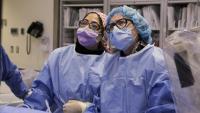Complex and High-risk Coronary Intervention (CHIP) Fellowship

| Application Deadline | October 14th |
| Number of Positions Per Year | 1 |
| Length of Program | 1 year |
| Program Start Date | July 1st |
Margaret B. McEntegart, MD
Fellowship Director
With recent advances in PCI technology and techniques there is currently a whole new era in interventional cardiology that can offer minimally invasive percutaneous solutions to patients with complex coronary anatomy, severe co-morbidities, and/or poor hemodynamics. However, because of the clinical complexity of many of these patients and procedures, it is critical to develop dedicated specialists within interventional cardiology who are trained with the cognitive and technical skills to select these patients appropriately and to perform these procedures safely. The Complex Higher-Risk (And Indicated) Patients (CHIP) fellowship at Columbia was developed to meet this unmet need.
The CHIP fellowship is a year-long fellowship which encompasses all aspects of complex and high-risk PCI from procedural training, patient screening to post-procedural care, as well as dedicated research.
The trainee’s primary responsibilities for the CHIP fellowship include the following:
- Cardiac catheterization laboratory: performing/assisting in high-risk diagnostic and interventional cases as these cases are scheduled, including those utilizing various forms of mechanical and other forms of hemodynamic support. The fellow would scrub selectively on high-risk cases (e.g. patients with depressed ventricular function, abnormal hemodynamics, and high-risk coronary anatomy). The fellow would also assist in the cardiac catheterization laboratory for other cases as required, based upon schedule and cath lab flow.
- Performing/assisting in chronic total occlusion revascularization procedures. This would include an active role in pre-procedure assessment, angiogram review and case planning and post-procedure care. Ideally, the fellow would be involved in as many CTO revascularization procedures as possible and aim to become familiar with both antegrade and retrograde strategies as part of the Hybrid approach to CTO revascularization.
- Heart Failure / Mechanical Circulatory Support service rounds and conferences: daily rounds on a rotating block basis on this very active service at Columbia/NYP, as well as post-procedural management of critically ill patients requiring mechanical and other forms of hemodynamic support in the intensive care units. This would include active participation in the shock team at NYP/CUIMC.
- The trainee will spend ½ day per week in the “Second Opinion, Advanced Coronary Clinic”. The trainee will be responsible for obtaining history, performing a physical and reviewing all relevant data including imaging before presenting the patient to the attending physician.
- Clinical and translational research in the CHIP space aimed at better understanding the patient population and helping to improve their outcomes.
- Participation and organization in CHIP educational events, such the CTO Summit, CHIP Florida, and the CRF Fellows’ Course.
At the end of the training program, the trainee will have the skills to be an independent operator for Complex and High Risk Coronary Procedures, as well as a successful clinical researcher in the field. The stated goal of the fellowship is to develop future leaders in the emerging area of revascularization for “Complex Higher-Risk (and Indicated) Patients”.
How to Apply
Applicants must have completed the General Cardiology and Interventional Cardiology Fellowships before applying to this advanced fellowship.
Candidates for this program should apply by emailing your application and required documents to Katherine Malave at km2984@columbia.edu.
We begin taking application on October 1st and deadline is October 14th.
Download the Advanced Fellowship Program Application
Contact Information
For further information, please contact:
Katherine Malave
Fellowship Program Manager
Interventional Cardiology
km2984@columbia.edu
212-305-2708